This comparison may be just the one you have been expecting for so long or just the opposite. However, it was quite challenging for me, so I’m looking forward to hearing more from you on this subject.
Speaking of over-advertising, Molekule Air is the kind of air purifier that gets all the attention, which is exactly why I decided to put it to the test against Winix 5500-2. A bit larger than most air purifiers, Molekule Air is a high-quality manufactured air purifier with PECO filter technology, promising to clean up to 600 sq. ft. of space around you, but it is more likely suitable for rooms of 160 sq. ft.
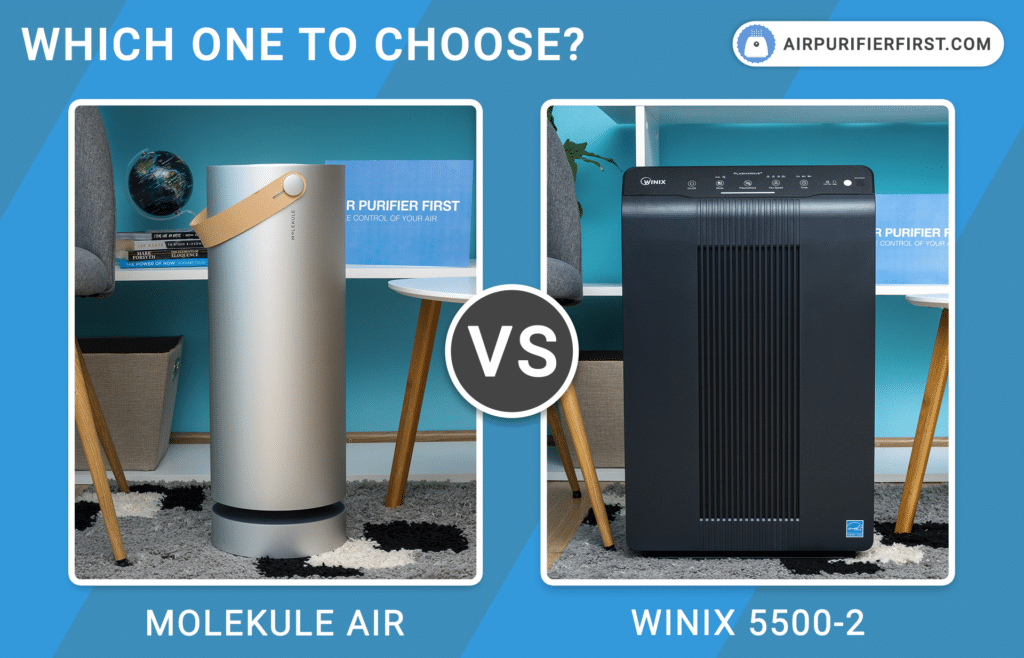
Table of Contents
Oppositely, Winix 5500-2 is one of the top air purifiers designed to clean up to 360 sq. ft. rooms, an air purifier that comes with loads of advanced features such as an Ionizer, Auto mode, and the most wanted gadget, the Remote control, etc.
For those of you who are prone to aesthetics, Winix can only be found in black color, while Molekule Air comes only in silver.
Apart from these seemingly competitive features both air purifiers withhold, this comparison is more than intriguing and with a slightly controversial price distinction.
Let’s see what it’s all about.
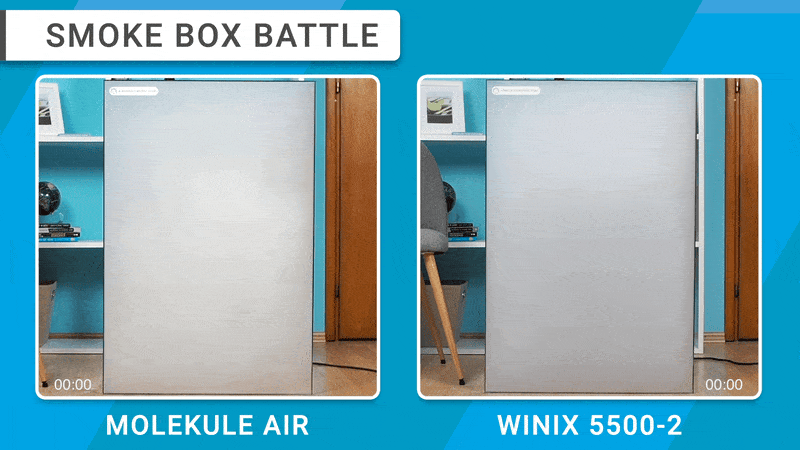
Specs: Molekule Air Vs Winix 5500-2
| Product Image | 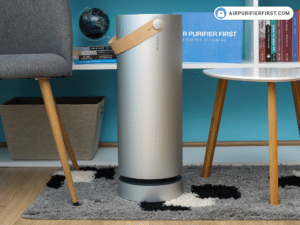 | 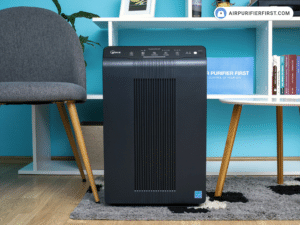 |
| Manufacturer | Molekule | Winix |
| Model | Air | 5500-2 |
| Dimensions (inches / cm) | 8.25 x 8.25 x 23 inches (20.1 x 20.1 x 58.4 cm) | 15 x 8.2 x 23.6 inches (38.1 x 20.8 x 59.9 cm) |
| Weight (pounds / kg) | 18.0 lb (8.2 kg) | 15.4 lb (7 kg) |
| Clean Air Delivery Rate (CADR) | - | 232 CFM (394 m³/h) |
| Coverage (4.8 ACH)
Room Coverage Explanation: ACH is a measurement used in indoor air quality management to indicate how many times the air within a defined space is changed/moved through the filter media.
For more details, visit our ACH calculator tool. | 130 sq. ft. (12 m²) | 360 sq. ft. (33 m²) |
| Performance Ratings Performance Ratings Score Summary: 8.5 - Average Score (67 products) 9.8 - Best Score (2 products) 2.5 - Worst Score (2 products) We use the Temtop LKC-1000S laser particle meter to test the particle removal efficiency of every air purifier. It measures PM2.5 (µg/m3), PM10 (µg/m3), Particles (per/L), and HCHO (mg/m3) in the air, and also calculates the AQI. You can read more about our testing methodology here. | ||
| Filtration Technology | Pre-filter and PECO-filter | Washable Pre-filter, Washable AOC Carbon Filter, and True HEPA Filter |
| Filter Replacement Indicator | Yes | Yes |
| Filter Life | 3 months (pre-filter), and 6 months (PECO-filter) | up to 12 months |
| Power Consumption
Power Usage Summary: Our extensive testing of 67 air purifiers revealed the following power consumption insights:
Check out our power consumption calculator tool. | 80W | 70W |
| Operating Costs Ratings Operating Costs Ratings Score Summary: 9.1 - Average Score (67 products) 10 - Best Score (2 products) 8 - Worst Score (1 products) We measure the power usage at all speeds using an energy meter, after which we calculate how much it would cost to use the device at a particular fan speed for one month. For reference, we use an energy price of $0.12 per kWh. You can read more about our testing methodology here. | ||
| Number of Fan Speeds | 3 – Silent Mode, Auto Mode, and Boost Mode | 5 – Sleep Mode, Speed 1, Speed 2, Speed 3, and Turbo Mode |
| Air Quality Sensor Air Quality Sensor Summary: Out of 67 air purifiers tested, only 31 have the air quality sensor. | No | Yes |
| Air Quality Indicator | No | Yes |
| Auto Mode Auto Mode Summary: Out of 67 air purifiers tested, only 32 have auto mode functionality. | Yes | Yes |
| Smart App Smart App Summary: Out of 67 air purifiers tested, only 20 have smart app functionality. | Yes | No |
| Voice Control Voice Control Summary: Out of 67 air purifiers tested, only 20 have voice control functionality. | Yes | No |
| Other Features | Dark Mode | PlasmaWaveLight SensorRemoteTimer |
| Noise Level (low – high) | 42.0 – 67.4 dBA | 40.6 – 66.4 dBA |
| Noise Ratings Noise Ratings Score Summary: 9.3 - Average Score (67 products) 10 - Best Score (1 products) 8.2 - Worst Score (1 products) We use a special noise measurement tool to test the noise level of the air purifier at all speeds. We measured the noise level on the dBA scale. You can read more about our testing methodology here. | ||
| Best Suited For | Small Spaces | Pets Living Rooms Kitchens Allergies Smoke Dust Neutralizing VOCs |
| Warranty | 2-year | 2-year |
| In-Depth Review | Molekule Air | Winix 5500-2 |
| Price | Check Price on Amazon | Check Price on Amazon |
Features Overview
You can tell by the comparison table that both air purifiers come with plenty of advanced features, whereas Winix 5500-2 does come with a minor advantage by providing some features that Molekule Air doesn’t.
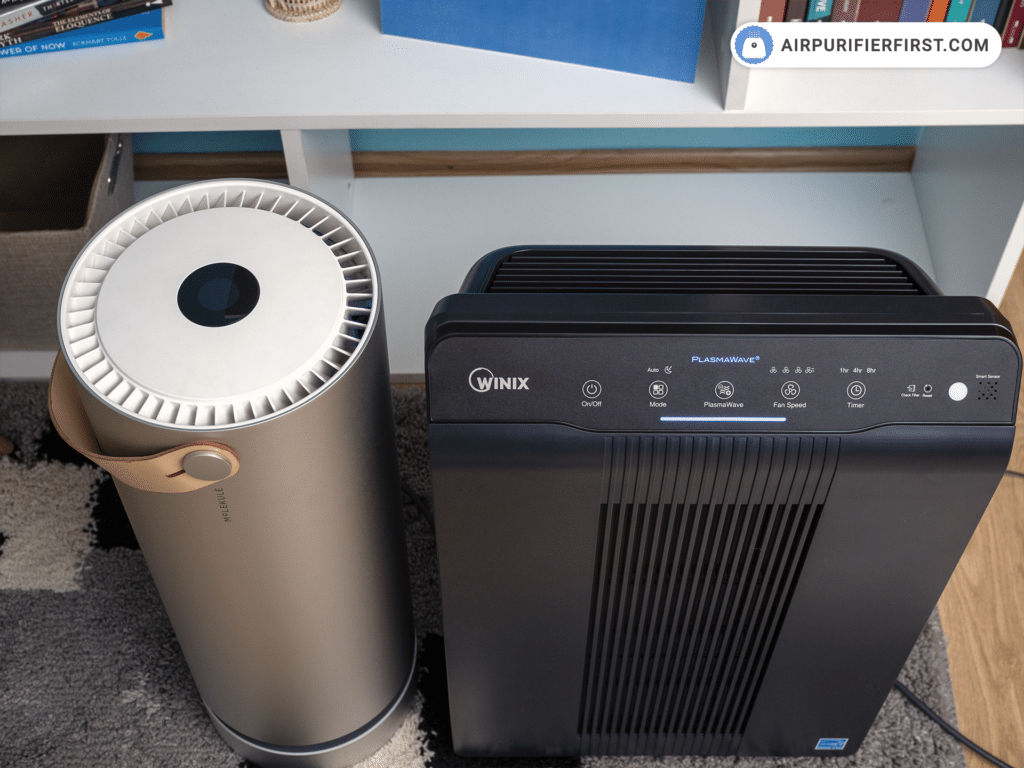
A feature like Filter Reset Indicator is something both devices have, with a slight differential in how they manifest. For instance, Winix has the kind of indicator that lights up when it’s time for replacement, while Molekule Air displays the overall filter usance.
Air Quality Sensor and Indicator
To begin with, Molekule Air does not have this feature, which is why Winix 5500-2 comes as a showoff. As you probably already know Air Quality Sensor is the indicator that detects odors and shows the exact quality of the air you’re inhaling. Therefore, depending on the air quality, it will light up in different colors.
In my opinion, it would be nice if this sensor could also detect dust particles, along with the odors, but still, I find it a very useful feature that an air purifier must have.
Auto Mode
Having an Auto Mode is the first feature I encountered during this comparison to be in common with both air purifiers.
Since Molekule Air does not have the Air Quality Sensor, the Auto mode is not the feature you’d expect an air purifier to have. Nevertheless, Auto Mode has a way of functioning in Molekule Air.
So, simply said, once you turn your air purifier ON, you can set up the room size on its display. Next, based on the room size, the Auto mode sets up the operating mode, and the machine does its job.
Overall, the Auto mode allows you three manually set up operating modes.
Looking at how Winix 5500-2 does the job, the Auto Mode feature is way more simple and enhanced than in the case of Molekule Air. The reason lies within the fact that the Auto mode relies on the Air Quality Indicator. Based on the real-time air quality, the Auto mode sets up a speel level. That way, you can easily rely on your device and let it do its job without paying too much attention.
PlasmaWave
Let me be quick on this one: Molekule Air comes without this option. On the other hand, Winix 5500-2 actually uses Plasma Wave as an Ionizer. Though it does its job perfectly, I must say that I find it a bit annoying that this option launches by default after the power is ON. Of course, you can always turn it OFF, if preferable.
Also, I must bring out the fact that Winix is CARB certified, which means no illicit amounts of ozone, and is completely environmentally safe.
Sleep Mode
Another great feature that both Winix 5500-2 and Molekule Air have in common is the Sleep Mode. In the case of Molekule Air, it is called the Dark Mode.
You can activate the Sleep Mode at Winix 5500-2 in two ways, manually or automatically. For instance, in the evening hours or if the room is darker than usual, the light sensor reacts by switching the air purifier into Sleep Mode. Once in this mode, all the indicators shut down, including the Sleep mode indicator, which slightly dims. This way, you can use the Winix air purifier in your bedroom because it will be silent.
As for the Dark Mode, once it is active, the indicators turn off. Also good if you plan to put this air purifier in your bedroom. However, I wouldn’t recommend using this mode very often, and here is why. This mode deactivates the UV light, one of the main parts of the PECO filtration system, therefore consequentially weakening the overall performance of the Molekule Air purifier. Basically, a good but also not-so-helpful feature.
Timer
To be short, Molekule Air does not come with the Timer option, which is a pity because Winix 5500-2 does. As we all know, this option allows you to set the working hours of your air purifier. This way, you can leave it purifying for an hour, 4, or even 8 hours. So convenient, right?
Remote Control
For all of you gadget lovers out there, it might be a disappointment to know that Molekule Air doesn’t have this option, whereas the Winix 5500-2 comes along with this device. Even though the controls are pretty basic, like Power, Speed Up/Down, Turbo, and Auto Mode, it still lets you control your air purifier from up far.
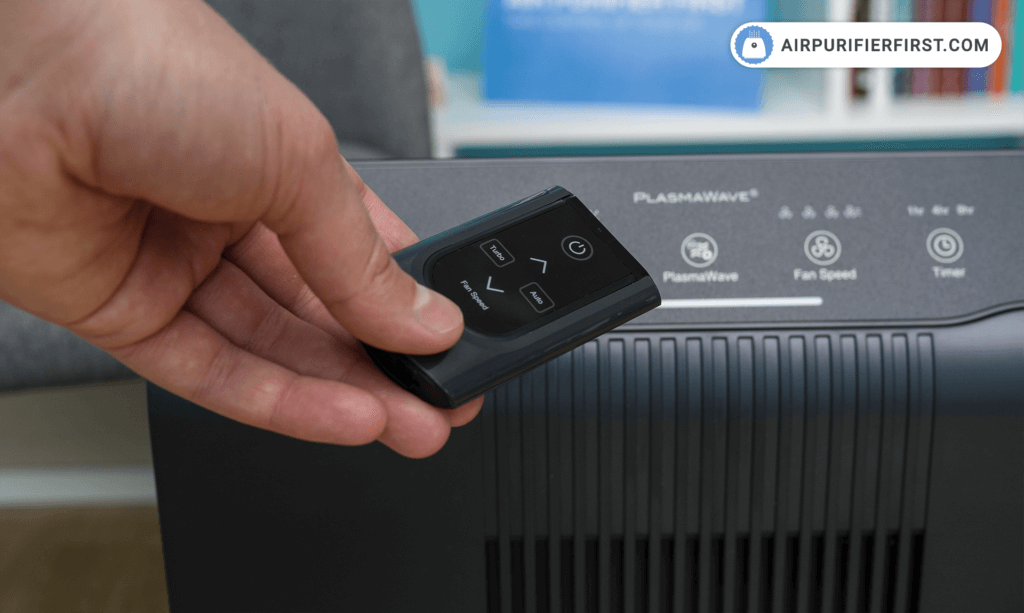
To be honest, given the age, we’re living in, having a Smart App is almost like a must-have. However, having a Remote Control is still a pretty useful and practical option.
Smart APP
Can you think of an easier way to control your device than by using a simple Smart app on your phone? Too bad that Winix 5500-2 doesn’t have this possibility.
However, Molekule Air can connect with your phone and be used for its purposes. You can find this app available in both Android and iOS stores. But, I have to admit I haven’t been able to use the Smart app since I couldn’t make a connection to any of the devices I used, whether it was an Android or iOS one.
Looking from a user’s perspective, if having a Smart app is important to me, I would expect it to work fluidly, right? It would really make me angry to fail at it. A pretty expensive failure for such a high-quality product as this one.
Airflow
Before I comment on the airflow of both devices, I have to point out probably the most obvious fact, which makes a clear difference in the way they clean the air. The Molekule Air and the Winix 5500-2 air purifiers are quite different in size and shape. Molekule Air has a cylindrical shape, while Winix has a rectangular one.
There is a small opening on the bottom side of the Molekule Air purifier where the air enters. After the filtration process is over, clean air spreads out into the room through the upper holes.
A bit different process in the case of Winix means that the air comes in frontally and on both sides from the bottom holes. Everything else is the same as in the example of Molekule Air, as the filtered air spreads across the room through the upper holes.
Warranty
There’s not much of a difference between these two air purifiers when it comes to warranty coverage. Each one is covered with two years of warranty. While I think it’s OK in the matter of Winix 5500-2, an expensive and high-quality air purifier such as Molekule Air should offer a lot more. That’s how you assure the end consumer that its high price is reasonable and that the product, thus the manufacturer, is reliable.
Filtration Technology
Speaking of the filtration system, there are quite differences between Molekule Air and Winix 5500-2. While the first one uses two filters plus extra UV light, the second air purifier has three filters with extra help from the Ionizer. Not to mention that Winix has a lot bigger filters than Molekule Air.
As expected, a pre-filter is equally in first place for both air purifiers. In the case of Molekule Air, we are talking about the MERV-12 filter, which prevents all the large dust particles, hair, etc., from penetrating the PECO filter.
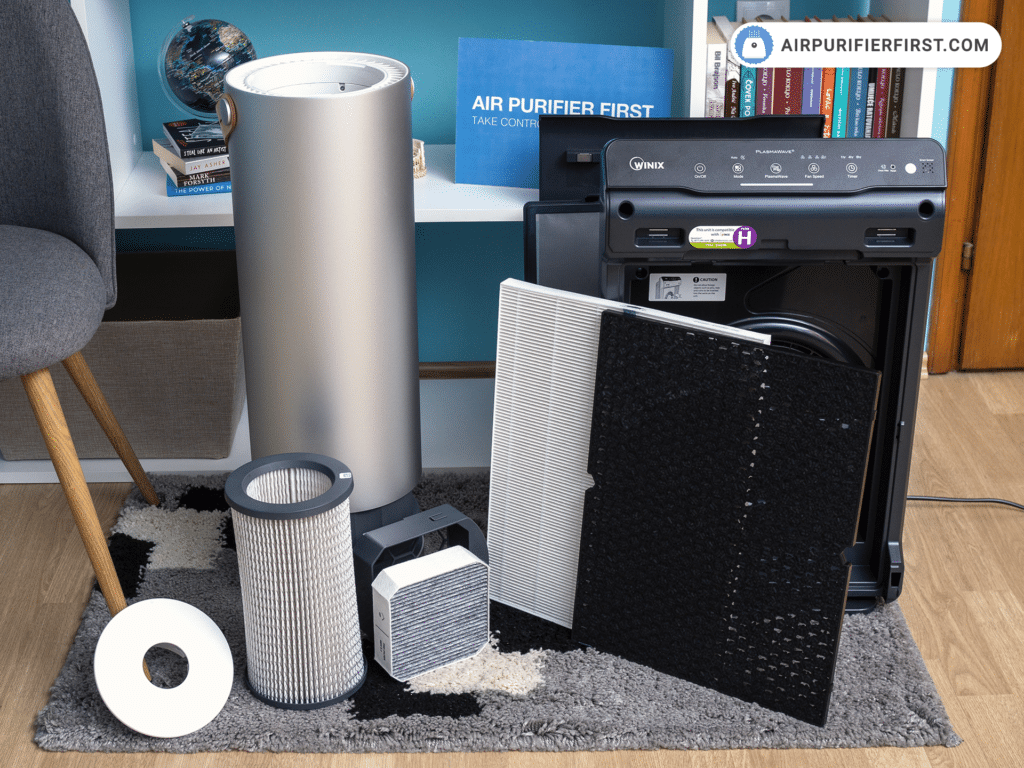
Winix’s pre-filter reminds me of a mosquito net, and the best thing is it’s washable. That only means no excuses, guys. If you want your True HEPA filter to last long, you better wash that pre-filter.
The second Winix filtration stage is a qualitative activated carbon filter consisting of carbon pellets, and the best thing is it is also washable. Now we come to the PECO filtrating technology, which stands for photoelectrochemical oxidation. The PECO technology is the second filtration stage in the Molekule Air purifier based on UV light, breaking the pollutants up to the molecular level. But if you want to know more about it, I recommend you read the review on the following link.
As for the third, final stage, Winix uses a True HEPA filter, promising to clean up to 99,97% of floating particles larger than 0,3 microns. This filter is the number one filter that elevates the air purifier’s performance to an outstanding level.
Additionally, there is PlasmaWave technology, in case you want your space to be extra clean.
In case you wondered about the difference between HEPA and PECO technology, it’s actually quite simple. HEPA filters practically ambush the airborne particles, while PECO filters totally tear them up all the way to the molecular level.
How To Replace Filter On These Devices?
How long will the filters of your favorite air purifier last mostly depends on how well you maintain them. Also, some of the manufacturer’s instructions are not to be disregarded.
You should know that filters in Winix 5500-2 can last up to 12 months, while filters in Molekule Air differ. The pre-filter in the Molekule Air purifier is supposed to be replaced every three months, and the PECO filter about every six months.
A very useful feature in both devices is a Filter Reset Indicator, which will let you know when the replacement is due.
Keep in mind what I said before, proper pre-filter maintenance is key to an air purifier’s longevity.
Noise Test
Having four-speed levels and a Sleep Mode gives the Winix 5500-2 a great advantage since Molekule Air has only three speeds.
| Product | Noise Range (dBA) |
|---|---|
| Molekule Air | 42.0 – 67.4 dBA |
| Winix 5500-2 | 40.6 – 66.4 dBA |
Generally, I had trouble with both of these air purifiers in defining the level of noise. The thing is, Molekule Air is quite loud while working at the top speed level, but not as nearly as Winix. On the other hand, Winix 5500-2 turned out to be a lot quieter on lower speed levels, which is awesome, considering the possibility of using the Sleep Mode as an extra option.
Performance Tests
Okay, the time has come to see the real deal with these two air purifiers. After all, the overall performance is what counts the most, right?
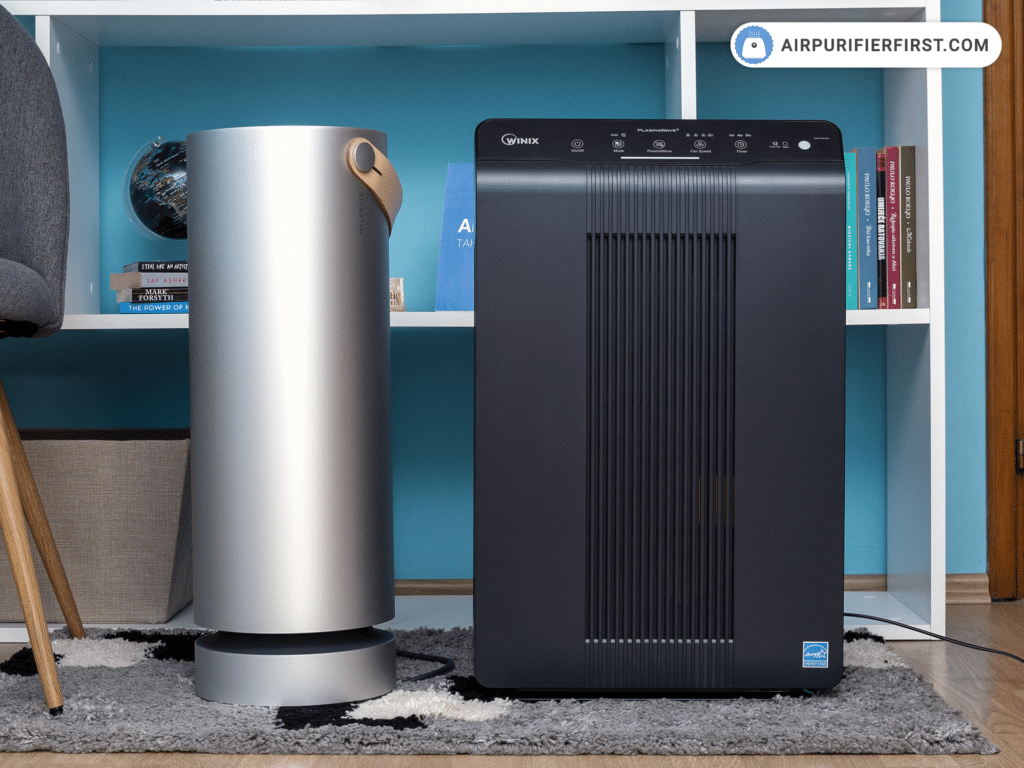
Speaking of, I decided to put both Winix 5500-2 and Molekule Air to the test for a full hour at top speed, and I did it in a 320 sq. ft. room space. Here’s what I found out.
320 sq. ft. Room Test
Mildly said, Molekule Air was literally blown away by Winix 5500-2, simply because it managed to clean the space for up to 96%, as opposed to 88% of Molekule Air’s end result.
320 sq. ft. Room
* Data measuring time is 60 minutes.
That’s not all. I was intrigued to go a little bit further with my tests by putting both appliances in a 560 sq. ft. room. Somehow I wanted to give the Molekule Air a second chance. After an hour of testing, the end result was about 70% improved air quality. Quite a disappointment.
Operating Costs
I want to explain this section by saying that both air purifiers have around the same wattage, which turned at about the same costs by the end of the month. With an 80W motor, Molekule Air caused a 6$ bill, working fully 24/7. Working in the same circumstances, Winix 5500-2 made a 5$ bill.
| Product | Wattage Range (W) |
|---|---|
| Molekule Air | 1.2 – 69.3W |
| Winix 5500-2 | 1.2 – 57.9W |
But there’s an interesting part to this test. The same UV light I have written previously is real electricity drain out, by sucking out 13.3W of power.
As for overall consumption, Winix is way more affordable and easier to maintain in the long run. Especially considering how often the Molekule Air demands a filter replacement.
Molekule Air Vs Winix 5500-2 Video Comparison
Which One Does It Better?
For the end of this comparison, I must say I was never so easy on giving my final thoughts out, up until now. My recommendations go in favor of Winix 5500-2 due to numerous reasons.
At first, it was all about loads of advanced features. Then I realized how quieter it is than the Molekule Air. With low maintenance costs and overall outstanding performance, there was no doubt in my mind that the Winix is the Winner.
It’s not that Molekule Air is bad or unreliable, it’s just the opposite. I am sure that it will find its place in the market, but still. With having an opponent such as Winix, Molekule Air didn’t stand a chance.
Tell me, how would you decide in this case and why? Looking forward to seeing your perceptions on this matter.
Leave a Reply